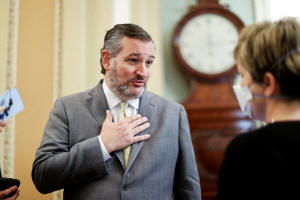U.S. Supreme Court weighs Senator Cruz's campaign finance challenge
 Send a link to a friend
Send a link to a friend
 [January 19, 2022]
By Lawrence Hurley and Andrew Chung [January 19, 2022]
By Lawrence Hurley and Andrew Chung
(Reuters) - The latest conservative attack
on a major campaign finance law goes before the U.S. Supreme Court on
Wednesday in Senator Ted Cruz's bid to undo a provision limiting the
amount of money candidates can be reimbursed for personal loans to their
own campaigns - a cap proponents call an anti-corruption measure.
Cruz, backed by fellow Republicans, has argued that the $250,000 loan
repayment cap violates the U.S. Constitution's First Amendment guarantee
of freedom of speech by unjustifiably burdening political expression.
The provision is part of a bipartisan 2002 law that already has been
chipped away at by the Supreme Court including in a landmark 2010 ruling
https://www.reuters.com/article/us-usa-court-politics/landmark-supreme-court-ruling-allows-corporate-political-cash-idUSTRE60K3SK20100121
that allowed unlimited independent spending by corporations and unions
during elections as constitutionally protected free speech. The court
has a 6-3 conservative majority.
The justices are set to hear arguments starting at 10 a.m. EST (1500
GMT) in an appeal by Democratic President Joe Biden's administration,
acting on behalf of the Federal Election Commision (FEC), of a lower
court ruling in favor of Cruz.

The FEC, which is defending the law, has said the provision was enacted
to deter corruption as it prevents political donors from making
contributions after an election that flow directly to a candidate.
Cruz was first elected to represent Texas in the Senate in 2012. Cruz
sued the FEC, which enforces election laws, after his successful 2018
Senate re-election race against Democratic rival Beto O'Rourke. Cruz had
lent his campaign organization $260,000 but was limited by the law to a
$250,000 reimbursement from his campaign.
The FEC has argued that Cruz does not have the proper legal standing to
bring the challenge because he deliberately loaned his campaign more
than the cap specifically in order to file his lawsuit.
The Supreme Court has struck down various provisions of the 2002
Bipartisan Campaign Reform Act (BCRA) - often called the McCain-Feingold
law in recognition of its two chief sponsors, former Senators John
McCain and Russ Feingold. The court's 2010 Citizens United v. FEC ruling
allowing unlimited independent corporate and union spending in elections
paved the way for "super PACs," political committees run separately from
campaigns that now play an outsized role in elections.
[to top of second column]
|

U.S. Senator Ted Cruz (R-TX) talks to reporters at the U.S. Capitol
in Washington, U.S. January 12, 2022. REUTERS/Jonathan Ernst/File
Photo
 Senate Republican Leader Mitch
McConnell, a longtime critic of the 2002 law who was the lead
plaintiff in a 2003 Supreme Court case in which the justices upheld
various provisions, filed a brief backing Cruz. McConnell asked the
justices to take the unusual step of striking down the law as a
whole, including restrictions on the ability of political parties to
raise and spend money.
"There is no reason to let BCRA limp along, no need for further
piecemeal surgery by this court: the court should strike the entire
statute," McConnell's lawyers told the justices.
Although Biden's administration is defending the law, no Democratic
politicians have filed briefs in the case on either side.
Campaign finance watchdogs have backed the FEC in the case, saying
that lifting the cap would increase expectations by political donors
for official favors by allowing people and corporations to donate
directly to a winning candidate after Election Day.
Cruz's lawyers have said the provision at issue serves no
anti-corruption purpose, noting that campaigns can use donations to
repay candidate loans before the election.
Like a related provision that the Supreme Court struck down in 2008
that let candidates raise more money than normally allowed if their
opponent was self-financed, the loan repayment cap was aimed to
protect incumbents facing wealthy challengers, according to Cruz's
lawyers.
A Washington-based panel of three federal judges in June 2021
unanimously struck down the provision as unconstitutional.

Cruz unsuccessfully sought his party's 2016 presidential nomination
and later became a prominent supporter of former President Donald
Trump.
(Reporting by Lawrence Hurley and Andrew Chung; Editing by Will
Dunham)
[© 2022 Thomson Reuters. All rights
reserved.] This material may not be published,
broadcast, rewritten or redistributed.
Thompson Reuters is solely responsible for this content. |